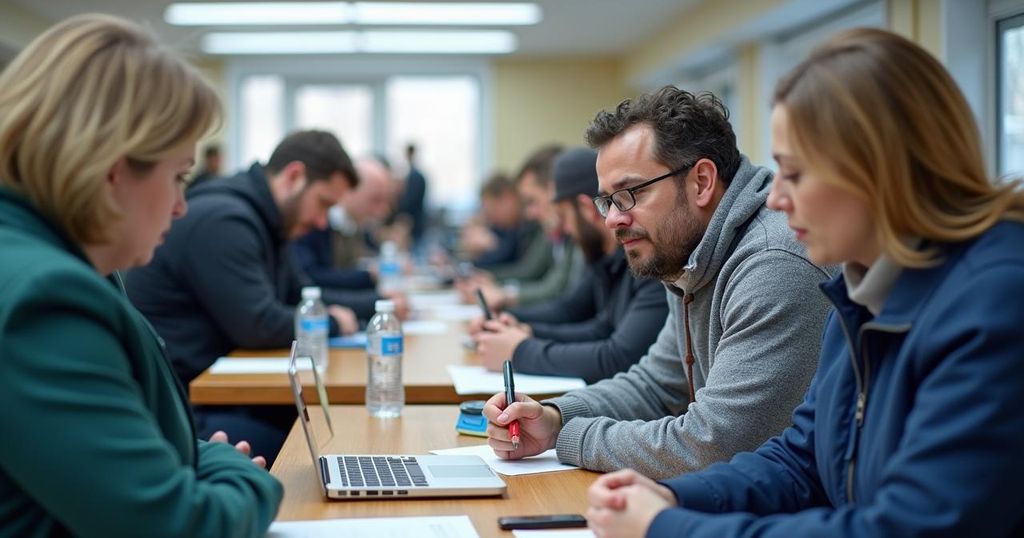Wisconsin is preparing for a significant increase in election observers this fall, driven by efforts from the Republican National Committee and the Democratic Party. In the wake of the 2020 election, concerns about election integrity have led to heightened scrutiny at polling places. Local officials express support for observers, citing improved compliance and public confidence, while also considering the need for careful management of observer conduct during the election.
This fall, Wisconsin is poised to experience a significant rise in election observers at polling places as national attention turns to this crucial battleground state during the upcoming elections. The Republican National Committee has initiated plans to deploy 100,000 poll watchers across the country, including 5,000 specifically in Wisconsin. Concurrently, the Democratic Party of Wisconsin has indicated that they will maintain a record presence of election observers throughout the state. Organizations, such as the League of Women Voters of Wisconsin, will also contribute by placing volunteers at polling locations to monitor the electoral process. This surge in election observers is a direct response to the contentious atmosphere following the 2020 presidential election, during which unfounded claims regarding election integrity gained traction, particularly by former President Donald Trump. Despite Trump’s allegations, he ultimately lost Wisconsin to President Joe Biden by approximately 21,000 votes, a result affirmed by recounts and judicial rulings. State law details the parameters within which election observers operate. They are required to sign in with election officials and are governed by restrictions on their proximity to voters during the voting process, maintaining a distance of three to eight feet from designated check-in tables. This ensures that observers can monitor the election without disrupting the voting activities. In large polling places, multiple areas may be designated for observers, whereas smaller locations might limit the number of individuals who can observe. Local officials, such as Fond du Lac County District Attorney Eric Toney, support the increased presence of election observers, asserting that “presence breeds compliance.” His comments reflect a broader sentiment among conservative leaders advocating for heightened vigilance at the polls. Toney suggests that an observer’s mere presence could enhance voter confidence in the electoral process. Moreover, both political parties are ramping up preparations to accommodate their observers and ensure the integrity of the voting experience. For example, the Democratic Party of Wisconsin intends to have poll watchers positioned across key localities, as stated by Joe Oslund. Election observers possess important duties, such as ensuring that all eligible voters can successfully cast their ballots and monitoring compliance with election laws. They have been actively trained to fulfill these responsibilities effectively. Eileen Newcomer, the voter education manager for the League of Women Voters of Wisconsin, noted that their observer program was initiated in 2010 to uphold the integrity of the election experience and assist voters if they encounter issues. However, the increased scrutiny has raised concerns among election officials about potential conflicts during the election process. Elena Hilby, clerk for the city of Sun Prairie, acknowledges the likelihood of heightened tensions at polling locations and emphasizes that clerks are preparing for any eventualities. In fact, previous instances of disruptive behavior from observers have occurred, leading to ejections at some polling sites. Preparations are underway to ensure a smooth electoral process while maintaining security and transparency. Observers are seen as integral to this effort, promoting confidence that elections are conducted fairly and transparently.
The significance of Wisconsin in national elections cannot be understated, particularly in the context of its pivotal role as a battleground state. The presence of election observers has surged in response to the contentious aftermath of the 2020 presidential election, wherein allegations of electoral fraud were widespread despite lack of substantiation. This article highlights the coordinated efforts by political parties and organizations to monitor the electoral process in Wisconsin, exploring the implications of increased observer presence on voter confidence and election integrity.
In conclusion, Wisconsin’s electoral landscape is set to witness a notable increase in election observers, reflecting both parties’ efforts to ensure a transparent and secure voting process amid heightened scrutiny. This development bears implications for voter confidence, moving forward with more observers likely fostering a sense of oversight and compliance within polling places. While the engagement of observers may bolster the integrity of the elections, it is imperative that proper protocols are adhered to, preventing potential disruptions and ensuring a fair electoral experience for all voters.
Original Source: www.wpr.org






